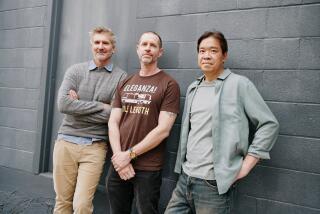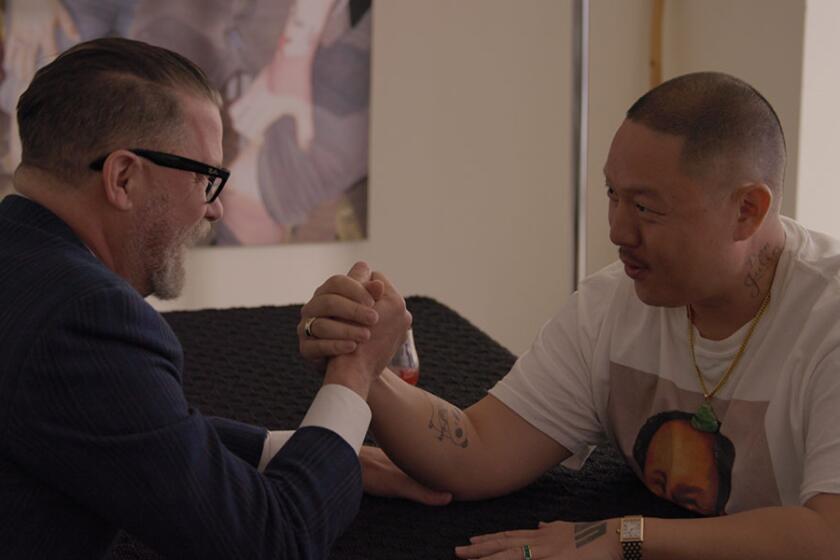Review: ‘The Hole,’ a 1998 film set during a pandemic, makes a welcome return
“If the epidemic is really prevailing in this area, they should have done something a long time ago. But they didn’t do a thing about it. They didn’t try to protect us.”
These words, excerpted from a newscast that could have been recorded yesterday, are among the first things we hear in “The Hole,” the 1998 feature by the great Taiwanese director Tsai Ming-liang. Greeted at that year’s Cannes Film Festival with baffled shrugs but also an international critics prize, this funny, melancholy and finally entrancing picture confirmed its maker’s growing stature within the New Taiwanese Cinema that flourished during the 1980s and ’90s.
Twenty-two years later, “The Hole” is receiving a welcome return via virtual cinemas, for reasons that are not hard to discern. It’s hard to imagine a better time to plunge into its vision of a pre-millennial Taipei whose cosmopolitan bustle has been drained away by a fast-spreading disease. Some, of course, may question the pleasure of watching a film on this particular subject at this particular moment; for every viewer who rented “Contagion” over the past six months, there was surely another who recoiled at the mere thought. But “The Hole,” for all its sorrowful prescience, does not traffic in the customary pandemic-thriller idiom of paranoia and alarm.
It may, however, present-day spasms of recognition, many of them quite funny. A genius of deadpan comedy as well as a poet of urban anomie, Tsai fills his meticulously composed frames with revealing details that often double as sight gags. A woman (Yang Kuei-mei) hoards toilet-paper rolls in her run-down apartment and at one point wears a face mask. A radio broadcast features a French scientist who suggests using terms like “the Taiwan virus” or “the Taiwan flu.” (Plus ça change.) The actual illness is its own strange creation; although it begins with flu-like symptoms, the most direly infected wind up crawling on all fours, mimicking the cockroaches that are apparently responsible for this citywide outbreak.
What we see of that city is confined to a crumbling apartment block in a dreadfully neglected quarantine zone, where water and other resources have been cut off — a situation barely remedied by the steady fall of rain, which we sometimes see and almost always hear. (This is one of the streamiest movies you’ll ever stream.) The depressive mood and general squalor seem to suit a young man named Hsiao-kang (Lee Kang-sheng), who occasionally steps out to run a nearby bodega but mostly holes up in his apartment, drinking beer. One day a plumber stops by to repair a leak and leaves a hole in the floor, opening a portal that connects Hsiao-kang to the aforementioned, unnamed woman who lives below.
Even those who’ve had a combative relationship with an upstairs or downstairs neighbor would be hard pressed to guess the precise nature of the tensions that arise, most of them instigated by the drunken Hsiao-kang and indignantly endured by the woman. Suffice to say that words are exchanged, household objects are inserted, and fluids are transmitted. The generous, sometimes grotesque comedy that flows through this movie plays like a tonic, but it also feels like the natural outcome of Tsai’s rigorously observant methods. His static frames and lengthy shots somehow become both sadder and funnier as they go on. And his actors, Lee and Yang — both veterans of Tsai’s earlier films, like “Vive l’Amour” (1994) and “The River” (1997), and mainstays of his more recent work — have the physical elasticity and emotional expressiveness of great silent comedians.
And great dancers. Did I mention that “The Hole” is also a musical? Every so often, the picture slips into a surreal, brightly colored dreamscape, marked by the captivating sight of Yang swaying and lip-syncing to the songs of the great 1950s pop idol Grace Chang. These increasingly elaborate production numbers seem to at once disrupt the narrative and well up from deep within it: We could be watching hallucinatory memories from brighter, happier times. Or we could be seeing a strange flowering of feeling between neighbors, as irritation and loneliness give way to curiosity, attraction and desire.
A near-magical intensity of feeling permeates these sequences, coalescing in two lyrical final shots that, in 22 years, have lost none of their sublimity. It’s a useful reminder that Tsai’s films — the latest of which, “Days,” will premiere this month at the New York Film Festival — are often dutifully filed away under the punishing rubric of “slow cinema,” even when the films themselves are anything but dutiful. Patiently attuned as they are to everyday boredom and melancholy, they are also inflected with music and melodrama, and born of the conviction that the human desire for connection can take the most wondrous forms. The feelings that “The Hole” awakens will be recognizable to anyone, even if no one else could possibly have made it.
‘The Hole’
In Mandarin and Taiwanese with English subtitles
Not rated
Running time: 1 hour, 29 minutes
Playing: Available through Laemmle Virtual Cinema
More to Read
Only good movies
Get the Indie Focus newsletter, Mark Olsen's weekly guide to the world of cinema.
You may occasionally receive promotional content from the Los Angeles Times.











